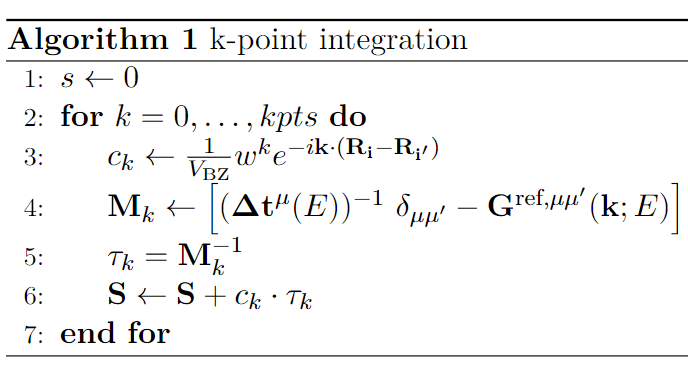
Performance Optimisation and Productivity
JuKKR kloop (original)
Version's name: JuKKR kloop (original) ; a version of the juKKR kloop program.Repository: [home] and version downloads: [.zip] [.tar.gz] [.tar.bz2] [.tar]
Patterns and behaviours: Recommended best-practices:
- Collapse consecutive parallel regions
- Upper level parallelisation - Available version(s): JuKKR kloop (openmp) ·
This version of the JuKKR-kloop kernel represents the original implementation of the k-point integration loop as found in the KKRhost code of the JuKKR code family. For simplicity it performs the k-point integration only for two selected energy points. These energy points are taken from a real simulation run of KKRhost on a 3D unit cell of a crystal lattice containing 4 gold atoms.
Algorithmically, the k-point integration loop looks as follows:

The variables in the algorithm have the following types: | Type | Variable | | :——: | :—-: | | Scalar | \(c_k\), \(V_{BZ}\), \(w^k\), \(e\) | | Vector | \(\textbf{k}\), \(\textbf{R}_i\), \(\textbf{R}_{i'}\) | | Matrix | \(\textbf{M}_k\), \(\textbf{\Delta t}_k\), \(\delta_{\mu \mu'}\), \(\textbf{G}_k\), \(\textbf{\tau}_k\), \(\textbf{S}_k\) |
First the exponential prefactor \(c_k\) is constructed. The computation of the matrix \(M_k\) involves an inverse Fourier transformation of \(G^{ref}\) to get \(G^{ref, \mu\mu'}\). Afterwards the inversion of \(M_k\) is done by computing an LU decomposition using the LAPACK routine \(\texttt{zgetrf}\).
In this version of the kernel the outer loop over all k-points is not parallelized. Note that in the full KKRhost application the k-points are distributed over multiple MPI ranks. So our kernel represents the computations that an individual MPI rank has to perform. For the LU decompositions in line 5 the threaded version of the Intel MKL is used to exploit OpenMP parallelism inside the MPI process.
This implementation leads to a sequence of very fine grained parallel regions. In terms of performance this causes a very bad scaling of the number of instructions per cycle (IPC) when increasing the number of OpenMP threads used. The reason is that the matrices \(M_k\) are very small. In this context a typical size for these matrices is \(32 \times 32\). Even for complex type matrices as in this case such a matrix easily fits into the L1-cache of a single core of current processors. If multiple OpenMP threads collaborate to compute the LU decomposition inside the Intel MKL call we probably see False-Sharing effects as the matrix probably resides in the cache of the CPU core that the master thread (= MPI process) runs on.
The following experiments have been registered: